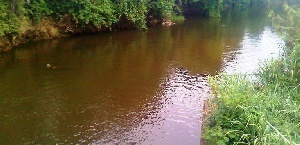About five months ago, the government of Ghana waged a war against illegal mining, popularly called galamsey, placing a ban on the activities, having impounded several mining equipment.
Following this action, led by the Minister of Lands & Natural Resources, John Peter Amewu, the heavily polluted Birim River is gradually restoring itself to its normal ecological state after the fight against illegal mining took a new twist with government unrelenting posture.
Some residents residing in some farming communities along the Birim River have begun drinking from the river.
Even some illegal miners are still operating at nights in the Atiwa forest and its surrounding areas near the Birim River but residents have hinted that the turbidity of the water has reduced drastically, hence safe for drinking.
The residents, elated by the state of the river, have commended government for the feat.
Illegal alluvia mining on the Birim River and release of mining waste into the river over the years led to heavy metal pollution which turned the water to a sickish mustard colour, with turbidity as high as 6000 NTU which forced a water treatment plant at Kibi to be shut down.
The Birim River is one of the main tributaries of the Pra River, flowing through most communities in the Eastern Region of Ghana from the Atiwa forest range.
The Birim River also flows north through the gap between this range and the Kwahu Plateau then runs roughly south-west until it joins the Pra.
The upsurge in mad rush for gold over a decade ago led to thousands of illegal miners, including some foreign nationals, mostly Chinese, invading the gold deposit belt of the country to prospect for gold.
The phenomenon led to the pollution of the Birim River and other river bodies which used to be a major source of drinking water for millions of Ghanaians.
Alluvia miners using Chinese technology known as ‘chanfan’ are still working, hence must be busted.
EPA Concerns
The decision by the residents to drink from the Birim River has raised some health concerns.
Amfo Otu, an environmental lecturer at the Presbyterian University College of Ghana, has described the act as inimical to the health of the residents, considering the level of heavy metal pollution of the river yet-to-be tested and declared wholesome for domestic use.
Speaking to journalists, he mentioned that drinking untreated water is even dangerous to people’s health, hence residents must be sensitised to refrain from the act.
The Eastern Regional Director of Environmental Protection Agency (EPA), Felix Addo-Okyireh, stated that the EPA would investigate the matter and advise residents accordingly.
Regional News of Tuesday, 4 July 2017
Source: dailyguideafrica.com

















